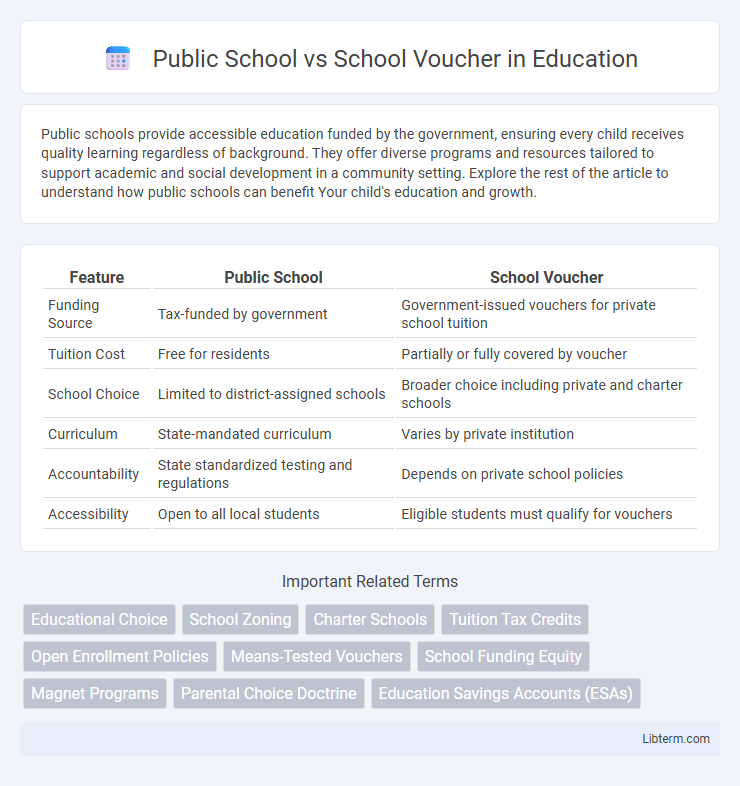Public schools provide accessible education funded by the government, ensuring every child receives quality learning regardless of background. They offer diverse programs and resources tailored to support academic and social development in a community setting. Explore the rest of the article to understand how public schools can benefit Your child's education and growth.
Table of Comparison
| Feature | Public School | School Voucher |
|---|---|---|
| Funding Source | Tax-funded by government | Government-issued vouchers for private school tuition |
| Tuition Cost | Free for residents | Partially or fully covered by voucher |
| School Choice | Limited to district-assigned schools | Broader choice including private and charter schools |
| Curriculum | State-mandated curriculum | Varies by private institution |
| Accountability | State standardized testing and regulations | Depends on private school policies |
| Accessibility | Open to all local students | Eligible students must qualify for vouchers |
Introduction to Public Schools and School Voucher Programs
Public schools are government-funded institutions providing free education to all children within a designated district, ensuring equal access to standardized curricula and qualified teachers. School voucher programs allocate public funding for parents to enroll their children in private or charter schools, promoting school choice and competition. This system aims to increase educational options while raising overall academic standards through market-driven accountability.
Historical Background of Education Funding
Public school funding in the United States has historically been derived from local property taxes, state revenues, and federal aid, creating disparities based on community wealth. The school voucher movement emerged in the 1950s as a response to educational inequality, aiming to provide families with options to attend private schools using public funds. This historical tension reflects ongoing debates about equity, school choice, and the role of government in education financing.
Key Differences Between Public Schools and Voucher Schools
Public schools operate under government funding and regulations, ensuring free education accessible to all students within a district, whereas voucher schools receive public funds through vouchers allowing parents to choose private or charter schools. Voucher programs often introduce competition by enabling families to use state-funded scholarships for tuition at private institutions, contrasting with public schools' boundary-based enrollment. Accountability measures vary significantly; public schools follow state standards and standardized testing, while voucher schools may have diverse curricula and less stringent reporting requirements.
Academic Performance: Comparing Outcomes
Public schools typically demonstrate steady academic performance due to standardized curricula and certified teachers, ensuring consistent educational quality. School voucher programs offer families the choice to attend private or charter schools, which can result in varied academic outcomes depending on school resources and teaching quality. Research indicates that while some voucher-funded schools outperform public counterparts, others show little difference, highlighting the importance of accountability and support in voucher systems.
Accessibility and Equity in Education
Public schools provide universal access to education funded by government taxes, ensuring that all children, regardless of socioeconomic status, have the opportunity to attend. School voucher programs offer families the option to use public funding for private school tuition, potentially increasing school choice but raising concerns about diverting funds from public schools and exacerbating inequities. Accessibility and equity debates center on whether vouchers improve educational opportunities for disadvantaged students or deepen resource gaps and segregation within the education system.
Financial Implications for Families and Taxpayers
Public schools are primarily funded through local property taxes and state funding, which can lead to more predictable and stable costs for families, while school vouchers redirect public funds to private schools, potentially reducing resources available for public school systems. Families using vouchers may face additional out-of-pocket expenses such as transportation, uniforms, and extracurricular fees not covered by the voucher amount. For taxpayers, vouchers can shift the financial burden by subsidizing private education, raising concerns about equity and the long-term sustainability of public education funding.
Impact on Teachers and School Staffing
Public schools typically provide stable employment with standardized salaries and benefits, promoting long-term teacher retention and collaboration within well-established staffing structures. School voucher programs can lead to fluctuating funding streams, causing instability in teacher job security and challenges in maintaining adequate staffing levels. This financial uncertainty often results in higher turnover rates and can negatively affect teacher morale and the consistency of educational quality.
Social and Community Effects
Public schools foster community cohesion by providing equal access to education regardless of socio-economic status, sustaining neighborhood diversity and social capital. School voucher programs can increase educational choice but risk exacerbating social stratification by diverting resources away from public schools and concentrating disadvantaged students in underfunded institutions. Research indicates that public schools often promote broader social integration and civic engagement, while voucher systems may limit interactions across diverse socio-economic groups, impacting community solidarity.
Policy Debates and Controversies
Policy debates surrounding public schools versus school vouchers center on funding allocation and educational equity, with public school advocates emphasizing the need for stable, transparent funding to support diverse student populations. Proponents of school vouchers argue that vouchers increase parental choice and foster competition, potentially improving overall educational outcomes. Controversies persist over whether vouchers divert essential resources from public schools and exacerbate social inequalities.
Future Trends in School Choice
Future trends in school choice emphasize the expansion of school voucher programs as families seek personalized education options beyond traditional public schools. Technological integration and data-driven accountability are expected to increase transparency and effectiveness in both public schools and voucher-funded private institutions. Policymakers are considering hybrid models that combine public funding with private school flexibility to better address diverse student needs.
Public School Infographic

 libterm.com
libterm.com